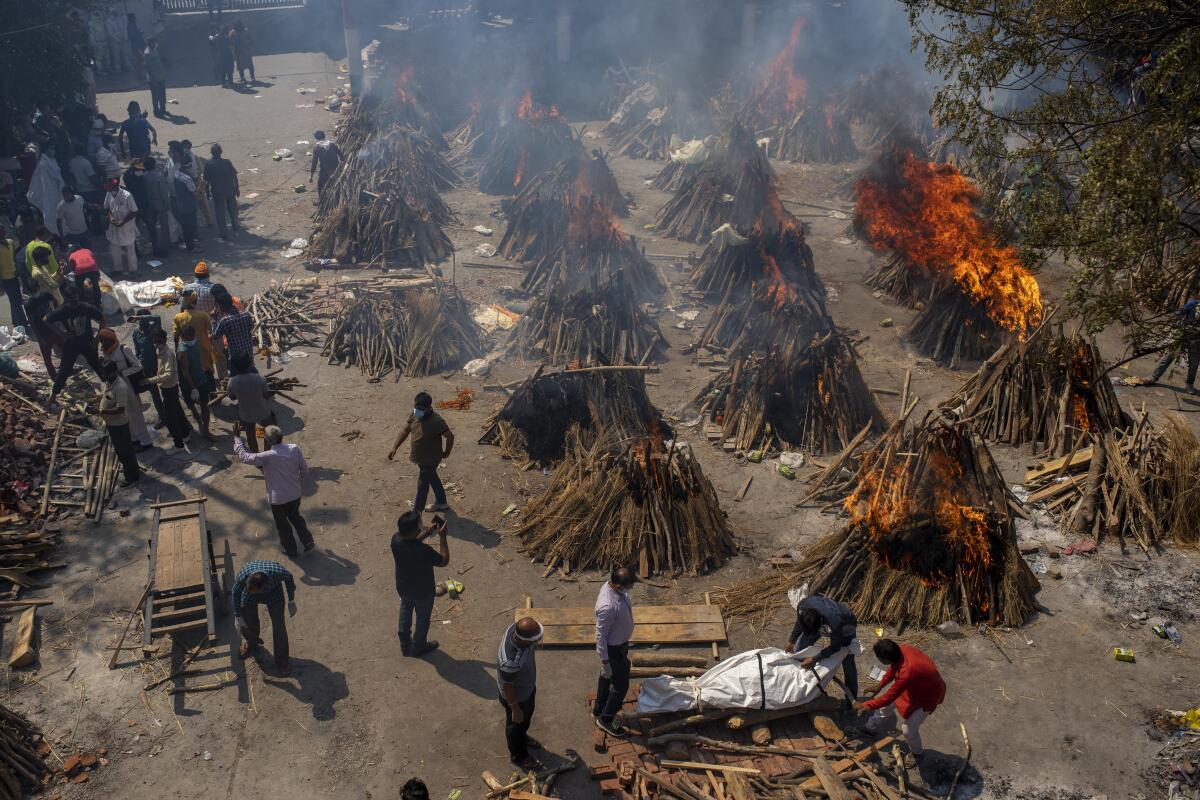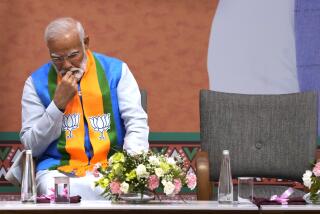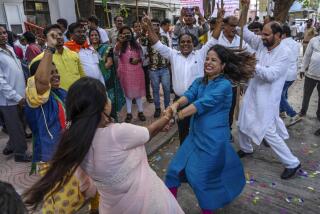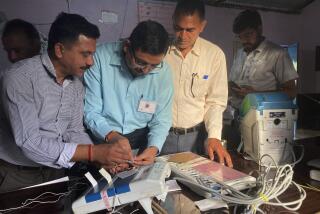Op-Ed: How anti-democratic politics make India’s COVID calamity worse

- Share via
“I cannot breathe.” My uncle, a physician in Delhi, recounted how the cry reverberated through the ward he was overseeing. Across the country, hundreds of thousands of Indians are dying — in their homes, on the streets, on the way to, outside and inside hospitals, including top private hospitals in Delhi, such as where my uncle works, that have exhausted their oxygen supplies.
The most immediate cause of their suffocation is a deadly new wave of an unpredictable, mutating novel coronavirus. But, as a political scientist who studies India, I also see shadows of the kind of deadly systemic force that bore down on George Floyd’s neck when he gasped the same last words. In India, that force of callousness and contempt takes shape as Hindu nationalism — propelled and promoted by Prime Minister Narendra Modi.
Because of Modi’s politics, COVID-19 has brought India to its knees and tens of thousands of Indians to their deathbeds. In the world’s largest democracy, the Modi regime must be held accountable for the terrifying surge of death and disease since March.
This is because the regime favored its own electoral interest over the safety and health of its citizens. In bombastic rhetoric characteristic of right-wing-populist “big men” such as Donald Trump and Jair Bolsonaro of Brazil, Modi earlier this year claimed credit for having defeated COVID. Virtually all restrictions on public gatherings were lifted.
This was a flagrant violation of public health advice. But it allowed the regime to continue to hold a number of key state elections, including in the battleground state of Bengal, where Modi’s Bharatiya Janata Party hoped, unsuccessfully, to oust the incumbent government. Hundreds of campaign rallies convened thousands of unmasked political supporters. Modi himself participated in the campaigns and lauded the “huge crowds of people” who had turned out.
Further, the regime gave the enthusiastic go-ahead to the Hindu pilgrimage and festival of Kumbh Mela, facilitating travel by 3.5 million devotees to the banks of the Ganges for a ritual dip. Few COVID protocols were followed, and the festival has unsurprisingly been a superspreader event.
Yet, an ill-advised but far smaller religious gathering of Muslims at the beginning of the pandemic, in March 2020, had caused the Modi regime to file serious charges against organizers and attendees — and many are still awaiting trial. That event also provoked more scapegoating of this religious minority, whose exclusion is at the core of the Hindu nationalist vision of India.
These self-serving, callous decisions were taken against the backdrop of the regime’s stillborn vaccination campaign. Despite being the world’s leading manufacturer of vaccines, supply-chain snags and complex sign-up procedures mean that as of today just about 2% of Indians are fully vaccinated. A more robust vaccination campaign might not have prevented the current wave of the virus, but it would have significantly curbed it.
Finally, the COVID calamity has been exacerbated by another crisis unfolding in India during Modi’s reign of power: the erosion of democracy.
Last month, Freedom House demoted India from “free” to “partly free,” reflecting the Modi regime’s widespread, relentless and often brutal curtailing of civil liberties, including attacks on freedom of speech and the press.
Indian nationalism was forged in the fierceness of effective nonviolent protest against the British. But the BJP’s brand of right-wing Hindu nationalism offers no space for dissent. Since assuming power in 2014, Modi’s government has hunted down opponents, whether young climate activists, civil society leaders, nongovernmental organizations, writers, artists, movie directors, Bollywood actors or the press. Journalists critical of the government have been gunned down outside their homes.
Today as parks, parking lots and even backyards are being turned into cremation grounds, and as the smell of death hangs over the capital, the Modi regime is busy pressuring Facebook, Twitter and Instagram to take down posts critical of it.
Nobel Prize-winning economist Amartya Sen and Jean Dreze famously showed that famines were caused not just by a shortage of food, but by the lack of a free flow of information and government accountability. Democracies that allow the press and citizens to publicly critique government actions have been shown to be immune to famines. Pandemics follow the same logic.
By cracking down on criticism of the government’s decisions before and during the COVID pandemic, the regime and its local allies have greatly exacerbated a natural disaster and have left millions of Indians sick and gasping for air.
Prerna Singh is Mahatma Gandhi associate professor of political science and international studies and holds an appointment at the school of public health at Brown University. She is the author of “How Solidarity Works for Welfare: Subnationalism and Social Development in India.”
More to Read
A cure for the common opinion
Get thought-provoking perspectives with our weekly newsletter.
You may occasionally receive promotional content from the Los Angeles Times.










